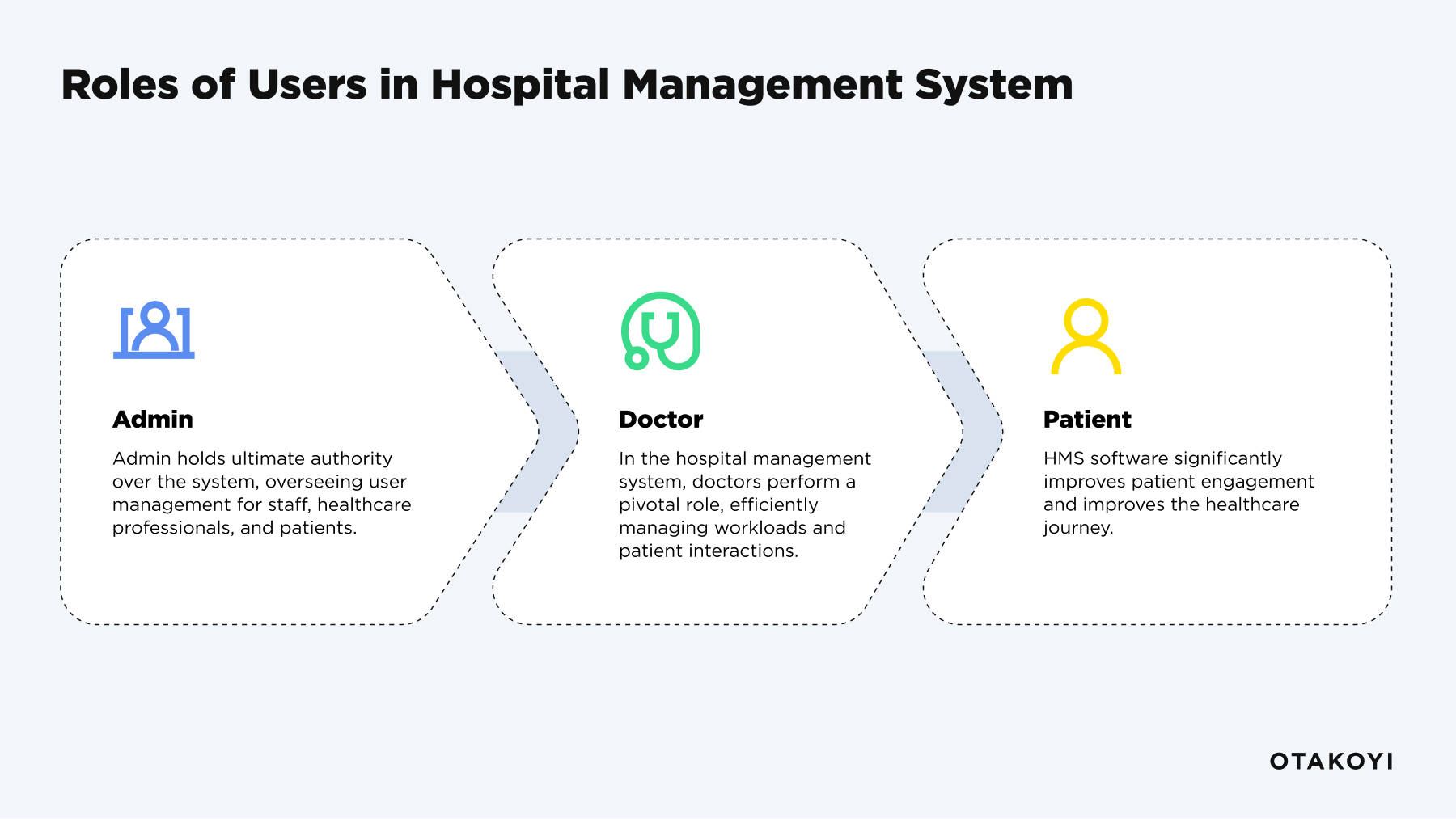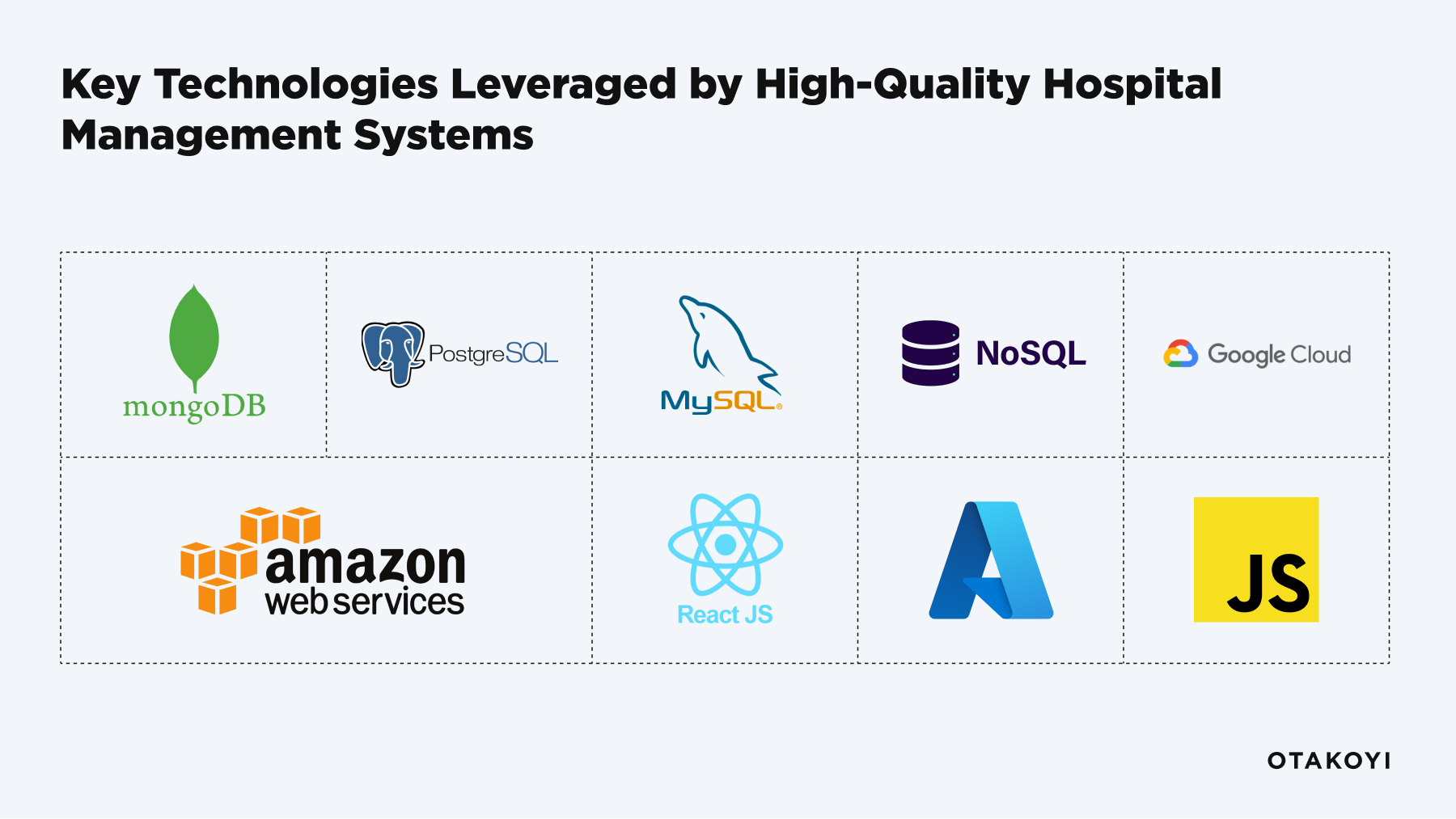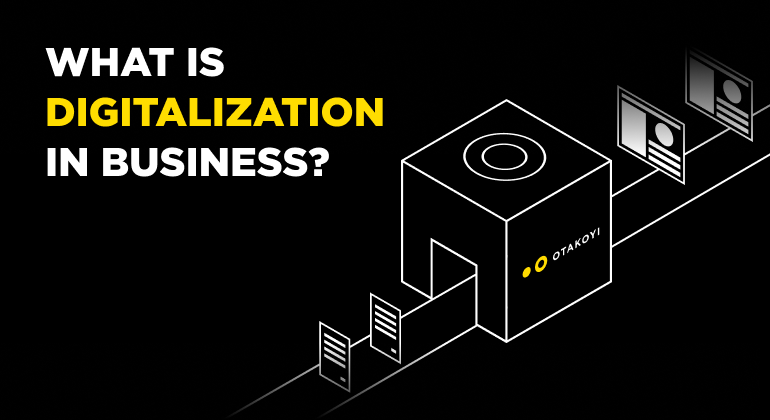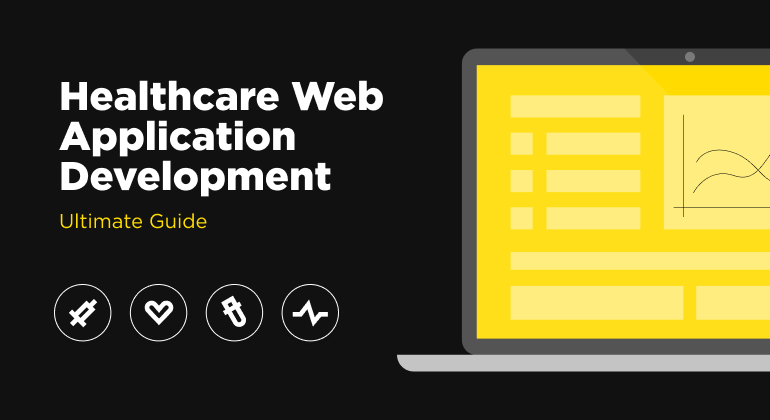Navigating Healthcare With Technology: What is a Hospital Management System?
Managinga healthcare facility is equivalent to running a business. Only the stakes are much higher. And one of the game-changing tools making waves in the healthcare industry is the Hospital Management System (HMS). We’re talking about a digital central hub that streamlines all essential administrative processes and operations, from medical records databases and appointment scheduling to billing and more.
Let’s dive into what is hospital management software all about and unveil hospital management system features and business-transforming benefits.
Importance of the Hospital Database Management System for the Healthcare Sector
If you had any doctor appointments in the past 4 years, you’ve engaged with the hospital management system in one way or another. Whether you’ve scheduled a visit online or the receptionist has registered all your personal information, allowing doctors access to your file.
But did you know that healthcare providers spend up to 35% of their time documenting patient data? The hospital database management system is a literal life-savor for healthcare facilities, enabling organizations to digitalize the paperwork and streamline other parallel processes.
So, what is a hospital management system exactly? Such software is designed to optimize all activities in the facility workflow, including administrative, financial, medical, and legal. The purpose of a hospital management system is to create an optimized and easily accessible database of patients’ medical history and digitalize business processes like inventory tracking, supply chain optimization, and staff management.
Now, let’s demystify the inner workings of HMS software to give you a better perspective on how it functions.
Roles of Users in Hospital Management System: How does it work?
Depending on the uses of a hospital management system, it serves as a connecting hub for medical professionals, administration staff, and patients. Let’s see what are the main roles within online hospital management systems and how they function.
 Admin
Admin
Same as in the actual medical facility, the admin role is the heart of hospital management systems. Admin holds ultimate authority over the system, overseeing user management for staff, healthcare professionals, and patients. The React JS framework enhances the admin experience with user-friendly, responsive, and seamless design.
The admin role takes care of the following tasks:
- Ensuring robust performance of HMS;
- Monitoring system health and usage;
- Technical maintenance and timely updates;
- Customizing software according to changing hospitals’ needs and requirements.
Doctor
In the hospital management system, doctors perform a pivotal role, efficiently managing workloads and patient interactions. Optimized HMS allows a healthcare provider to enhance productivity, avoid burnout, and improve patient care quality.
Under the doctor role, the HMS tasks can include:
- Scheduling and overseeing appointments;
- Updating post-consultation records;
- Accessing patient medical histories;
- Providing digital consultations and prescriptions.
Patient
Lastly, HMS makes healthcare easily accessible to everyone. With robust patient experience, HMS software significantly improves patient engagement and improves the healthcare journey.
Tasks for a patient role in the hospital management system include:
- Scheduling visits through the appointment widget;
- Viewing personal medical records and history;
- Making instant payments for healthcare services;
- Reviewing prescriptions and treatment plans;
- Receiving digital medical advice.
The bottom line, the hospital management system isn’t limited by internal operations. HMS bridges healthcare professionals with their patients, facilitating transparent communication, improving medical care quality and accessibility, and revolutionizing healthcare service delivery. 59% of millennials stated they would switch doctors for better online access. The study supports that enhanced communication between healthcare providers and patients is a pivotal aspect of patient engagement in the new digital-centric reality.
11 Must-have Hospital Management Modules
The functionality of the hospital management system allows healthcare facilities to benefit from a comprehensive solution to provide outstanding medical services. Here is the list of must-have HMS modules each hospital needs for business empowerment and workflow optimization.
1. Patient Management
One of the core modules of a hospital management system allows for centralizing patient profiles, electronic health records, personal medical patient histories, and treatment plans for improved care coordination.
2. Appointment Management
An effective hospital management system automates the scheduling of appointments and gives medical staff control over patient flow, reducing wait times and human errors and optimizing resource allocation. Moreover, recent research revealed that 68% of patients would rather choose a hospital offering online appointment booking, management, and cancellation.
3. Staff Management
With a staff management module, hospital management systems streamline staff information, duty schedules, administrative task assignments, and performance tracking, creating efficient workforce management.
4. Facility Management
Inner-centric hospital management system oversees the healthcare facility infrastructure, room allocation and maintenance, and data from multiple branches to ensure a productive environment.
5. Supply Management
The hospital management systems’ supply module allows tracking and managing medical inventory to guarantee the availability of essential medical supplies and minimize wastage.
6. Laboratory Management
The laboratory information system enables healthcare professionals to effectively manage lab tests, results, and equipment maintenance to enhance diagnostic accuracy.
Contact us and get started on improving administration within your organization
7. Vaccination Management
With vaccination management system software, medical staff can access the history of patient vaccines, create new schedules, and ensure timely immunizations and disease prevention.
8. Financial Management
A cloud-based hospital management system oversees billing, payments, and revenue cycles while ensuring compliance with financial regulations.
9. Report Management
Stakeholders and decision-makers in healthcare organizations can utilize a hospital management system for generating and storing various reports, such as patient records or financial statements, for data-driven judgment.
10. Support Management
With a hospital management system, clinics can provide support department needed tools to handle patient complaints and feedback to boost customer satisfaction and ensure impeccable service.
11. Insurance Management
Integrating hospital management systems with insurance modules provides seamless claims processing and reduces administrative setbacks.
Elevate your Hospital Management System: Features to Consider
When building a smart hospital management system, you should prioritize functionality that elevates user experience and drives patient satisfaction. Here are the key features of a hospital management system that experts advise to introduce. However, keep in mind that HMS software can be modernized and customized according to unique requirements. So don’t limit yourself to the following list.
Electronic Medical Records Management Software
Centralize patient information with ERM capabilities, including comprehensive profiles, medical history, diagnostic reports, and treatment plans. Introducing electronic medical records to a hospital management system provides quick access to updated data and enhances patient care coordination.
Patient scheduling system
Elevate hospital management systems with intuitive scheduling systems. Features like real-time availability, automated reminders, and waitlist management enhance patient experience and reduce no-shows.
Billing
A cutting-edge billing module should support invoicing, insurance claims, and online payments. Such a feature will optimize the hospital management system to automate accurate and timely financial transactions, providing a secure and transparent environment for financial operations.
Lab Integrations
An ahead-of-the-curve hospital management system can support integrations with third-party facilities to streamline lab-related operations, like test ordering, result entry, sample tracking, and equipment maintenance. Laboratory integrations ensure seamless data flow, guaranteeing a patient record stays up-to-date for accurate diagnosis.
Mobile App
Grow hospital management system outreach with a mobile app. The HMS application facilitates communication between patients and healthcare providers. Patients can use the app to book appointments, access medical records, and receive notifications and reminders. On the other hand, medical professionals can manage tasks on the go and provide online care for patients, enhancing flexibility and accessibility.
Reports and data analytics tools
Hospital management system software features cover data analytics tools to gain valuable insights from patient records, financial data, staff performance, and operational metrics. Customizable reports enable informed and data-driven decision-making, empowering healthcare facilities for continuous improvement.
Inventory Management
You can’t efficiently run a hospital without automated inventory management and tracking. Introduce features like reordering points, consumption tracking, and stock level management to prevent shortages and wastages in medical facilities.
Benefits of Hospital Management System Development
According to Statista’s forecast, the market value for so-called smart hospitals will reach $83.1 billion in 2026. Innovative healthcare tech solutions like a hospital management system are on the rise since the global pandemic of 2020 highlighted the state of the industry. HMS software offers countless benefits for medical facilities, patients, and the entire healthcare sector. Let’s focus on the most significant advantages that arise from implementing HMS.
Boosted Operational Efficiency
The hospital is a complex, multi-level system. Various hospital management system types and uses streamline time-consuming administrative tasks and digitalize crucial hospital processes. Such automation reduces manual and medical errors, minimizes paperwork, and accelerates admin processes, leading to smooth and efficient day-to-day operations.
Enhanced Resource Utilization
With a hospital management system, medical institutions can effectively manage resources, including professional staff, rooms, inventory, and equipment. Elevated allocation and utilization result in reduced wait time, optimized patient flow and boosted operational efficiency.
Improved financial management
After all medical center, hospital, or clinic is a business that needs top-notch financial management solutions. The agile hospital management systems powered by financial modules enable accurate billing, real-time payment tracking, and accelerated insurance claims processing. As a result, healthcare institutions get improved revenue capture, reduced billing errors, and enchanted financial transparency.
Increased Competitive Advantages
As with any other business, facilities in the healthcare sector need to gain a competitive edge to drive patient engagement. Hospitals can achieve staying ahead of their competitors by embracing technology and innovation. A state-of-the-art software solution as a hospital management system enhances patient satisfaction, engagement, and loyalty, positioning medical facilities as a preferred choice in the competitive healthcare landscape.
Access to New Markets
Incorporating a hospital management system into the healthcare facility environment can expand its horizons and outreach. Robust HMS enables accessible and ahead-of-the-curve telemedicine services, allowing patients from remote locations access medical consultations and services. From a business perspective, it potentially opens up new markets to concur and revenue streams to benefit from.
Improved Data Management & Security Compliance
Hospital management systems act like centralized databases for storing patients’ records, ensuring a single source of accurate and up-to-date medical information. Accessible digital database aids healthcare providers in making informed decisions for accurate and timely diagnosis.
Additionally, HMS’s robust security measures and compliance with healthcare data regulations safeguard sensitive patient data, ensuring and adhering to regulatory requirements.
Development Requirements for Building HMS
Creating a state-of-the-art hospital management system demands well-thought-through planning, a comprehensive approach, and a clear understanding of the system’s requirements. Let’s take a look behind the curtains and break down the development requirements.
Technological
Developing even a simple hospital management system calls for in-depth proficiency in specific technologies:
Platform and Languages: Choose a suitable programming language and platform for development based on the scalability and compatibility factors;
Security measures: Implement robust security protocols such as encryption, role-based access control, and authentification to shield sensitive and personal data.
Mobile Compatibility: Ensure mobile responsiveness and compatibility across devices and various operating systems if you’re seeking to develop a mobile app.
Cloud services integrations for scalability, data backup, and accessibility from multiple locations.
Web framework that allows intuitive user interface design and ensures a seamless user experience.
Functional
Hospital management systems should fulfill the healthcare institutions’ diverse needs and aid professionals in providing high-quality medical service. Consider the following functional requirements:
Scalability and reliability: The HMS should be ready to accommodate your business growth and stay a consistently reliable solution.
User-orientated interface: HMS should be intuitive and easy to navigate for users on different specters of tech proficiency.
Database management: Find a robust DBMS ( database management system) for securely storing and managing patient data, records, private details, and other essential information.
Robust integration capabilities: Ensure HMS seamlessly integrates with other software in a hospital or third-party systems, like lab equipment or billing software, to minimize performance issues.
Regulatory Compliance: Any HMS must comply with healthcare regulations in your region, like the Health Insurance Portability and Accountability Act (HIPPA), for data privacy and security.
Testing and Maintenance
Testing: Conduct QA, unit testing, bug tracking, and integration testing to validate that the hospital management system is ready for the launch.
User training: Educate and train hospital staff and medical professionals on system usage for seamless adaptations and maximized utilization.
Maintenance and update monitoring. Maintain HMS post-launch to spot any performance or scalability on time and implement needed optimization updates.
Security audits: periodically audit the HMS software to identify vulnerabilities and ensure regulatory compliance.
Hospital Management System development requires collaboration between developers, healthcare professionals, and stakeholders to deliver a solution that enhances healthcare operations and elevates patient care.
Key Technologies Leveraged by High-Quality Hospital Management Systems
Let’s say you aim high - your goal is creating a world-class quality hospital management system. One should rely on a combination of out-of-the-box technologies to deliver a state-of-art HMS. Discover the key tech a modern HMA leverages.

AI and Machine Learning
Artificial Intelligence (AI) and Machine Learning (ML) algorithms are integrated into hospital management systems for patient data analysis, trend predictions, and decision-making assistance. This tech can aid medical professionals in diagnosing diseases, optimizing resource allocation, and enhancing patient outcomes.
React JS
A popular JavaScript library, React JS, offers a responsive and user-friendly front end for a hospital management system. Its component-based architecture facilitates modular development, improving user experience and allowing fast updates.
Database Technologies
Databases like MongoDB or systems such as PostgreSQL, MySQL, or NoSQL empower a hospital management system to store and manage sensitive and essential patient data and other critical information.
Blockchain
It’s crucial for hospital management software to prioritize data integrity and privacy. Blockchain technology guarantees secure and transparent patient data management and interoperability among different healthcare institutions, increasing patient trust and improving data sharing.
Cloud Computing
Cloud platforms like Google Cloud, Microsoft Azure, or Amazon Web Services (AWS) provide hospital management systems with scalable infrastructure, ensuring flexibility and easy adaptation as the HMS user base grows.
Cybersecurity Technologies
The hospital information management system is obligated to demonstrate robust cybersecurity measures, including multi-factor authentication, intrusion detection systems, and encryption, to shield medical records and patient data from breaches and unauthorized access.
Hospital Management Software Development with OTAKOYI
Are you ready to build a ground-breaking solution for healthcare that will not only change lives but potentially save them? Our development team has outstanding skills, talent, revolutionary vision, and a future-proof approach to deliver you a state-of-the-art hospital management system.
Got the idea and inspiration? Pair it up with our in-depth knowledge and proven proficiency in healthcare digital solution development to build a reliable, scalable, and robust HMS. Discover how to develop a hospital management system from scratch and what is the average cost.
Ready to revolutionize the healthcare world and patient care with powerful HMS software? So quit dreaming, and let’s act! Together we will shape a healthier and more efficient tomorrow.






